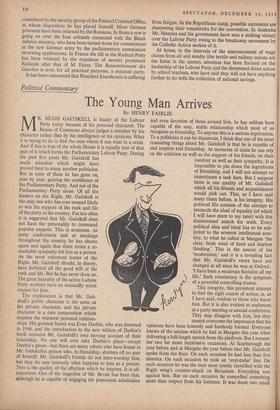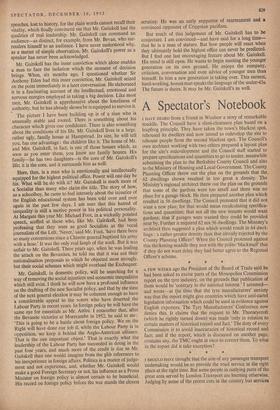Political Commentary
The Young Man Arrives
BY HENRY FAIRLIE The explanation is that Mr. Gait- skell's public character is the same as his private character, and his private character is a rare composition which inspires the warmest personal relation- ships. His greatest friend was Evan Durbin, who was drowned in 1946. and the introduction to the new edition of Durbin's book contains Mr. Gaitskell's own moving account of their friendship. No one will ever take Durbin's place—except Durbin's ghost—but there are many others who have found in Mr. Gaitskell..a person who, in friendship, shutters off no part of himself. Mr. Gaitskell's friends do not hero-worship him, but they do care intensely what happens to him as a person. This is the quality of the affection which he inspires. It is all- important. One of the tragedies of Mr. Bevan has been that, although he is capable of engaging the passionate admiration and even devotion of those around him, he has seldom been capable of the easy, stable relationship which most of us recognise as friendship. To anyone this is a serious deprivation. To a politician it can be disastrous. I think that one of the most reassuring things about Mr. Gaitskell is that he is capable of and inspires real friendship. At moments of crisis he can rely on the criticism as well as the support of his friends, on their candour as well as their sympathy. It is impossible to pin down the ingredients of friendship, and I will not attempt so impertinent a task here. But I suppose there is one quality of Mr. Gaitskell which all his friends and acquaintances would pick out. This, as I have said many times before, is his integrity. His political life consists of the attempt to reconcile the ideal of equality (of which I will have more to say later) with this disinterested search for truth. Every political idea and ideal has to be sub- jected to the severest intellectual scru- tiny, to what he called at Margate 'the clear, fresh wind of hard and fearless thinking.' This is the source of his `moderation,' and it is a revealing fact that Mr. Gaitskell's views have not changed at all since he was at Oxford : `I have been a moderate Socialist all my life.' Such consistency is the symptom of a powerful controlling reason.
This integrity, this persistent attempt to find the right course of action, is, as I have said, evident to those who know him. But it is also evident to audiences at a party meeting or annual conference. They may disagree with him, but they cannot overcome the impression that his opinions have been honestly and fearlessly formed. Everyone knows of the success which he had at Margate this year when delivering a full-length speech from the platform. But I remem- ber two far more impressive occasions. At Scarborough the year before and at Margate the year before that Mr. Gaitskell spoke from the floor. On each occasion he had less than five minutes. On each occasion he took an 'unpopular' line. On each occasion he was the man most openly identified with the Right wing's counter-attack on Bevanism. Everything was against him. But on each occasion he compelled something more than respect from his listeners. It was those two small ,speeches, lost to history, for the plain words cannot recall their vitality, which finally convinced me that Mr. Gaitskell had the qualities of real leadership. Mr. Gaitskell can command an audience—as distinct, for example. from Mr. Bevan, who sur- renders himself to an audience. I have never understood why, as a matter of simple observation, Mr. Gaitskell's power as a speaker has never been acknowledged.
Mr. Gaitskell has the inner conviction which alone enables a man to face the isolation which the moment of decision brings. When, six months ago, I questioned whether Sir Anthony Eden had this inner conviction, Mr. Gaitskell seized on the point immediately in a later conversation. He elaborated it in a fascinating account of the intellectual, emotional and nervous energies employed in taking a big decision. Like most men, Mr. Gaitskell is apprehensive about the loneliness of authority, but he has already shown he is equipped to survive it.
The picture I have been building up is of a than who is unusually stable and rooted. There is something about his character which gives one confidence. There is also something about the conditions of his life. Mr. Gaitskell lives in a large, rather ugly, family house at Hampstead. Its size, he will tell you, has one advantage : the children like it. The home of Mr. and Mrs. Gaitskell, in fact, is one of those houses which, as soon as you enter them, you know are family houses. His family—he has two daughters—is the core of Mr. Gaitskell's life; it is the core, and it surrounds him as well.
Here, then, is a man who is emotionally and intellectually equipped for the highest political office. Power will one day be his. What will he do with it? Mr. Gaitskell is much more of a Socialist than many who claim .the title. The story of how, as a schoolboy, he came to feel intensely about the injustice of the English educational system has been told over and over again in the past few days. I am sure that this hatred of inequality is still a motive power in his political personality. At Margate this year Mt. Michael Foot, in a wickedly pointed speech, scoffed at those who, like Mr. Gaitskell, had been professing that they were as good Socialists as the vocal journalists of the Left. 'Never,' said Mr. Foot. 'have there been so many conversions since a Chinese general baptised his army with a hose.' It was the only real laugh of the week. But it was unfair to Mr. Gaitskell. Three years ago, when he was leading the attack on the Bevanites, he told me that it was not their nationalisation proposals to which he objected most strongly. but their social schemes which might overload the Exchequer.
Mr. Gaitskell, in domestic policy, will be searching for a way of removing the social injustices and economic inequalities which still exist. I think he will now have a profound influence on the drafting of the new Socialist policy, and that by the time of the next general election it'may be coherent enough to have a considerable appeal to the voters who have deserted the Labour Party in recent years. In foreign policy he will have the same eye for essentials as Mr. Attlee. I remember that, after the Bevanite victories at Morecambe in 1952, he said to me : `This is going to be a battle about foreign policy. We on the Right will have done our job if, while the Labour Party is in opposition, we keep it behind the Anglo-American alliance. That is the one important object.' That is exactly what the leadership of the Labour Party has succeeded in doing in the past four years, and much more of the credit is due to Mr. Gaitskell than one would imagine from the glib references to his inexperience in foreign affairs. Politics, is a matter of judge- ment and not experience, and, whether Mr. Gaitskell would make a good Foreign Secretary or not, his influence as a Prime Minister on foreign policy is almost certain to be beneficial. His record on foreign policy before the war stands the closest scrutiny. He was an early supporter of rearmament and a convinced opponent of Crippsian pacifism.
But much of this judgement of Mr. Gaitskell has to be conjecture. I am convinced—and have said for a long time— that he is a man of stature. But how people will react when they ultimately hold the highest office can never be predicted. But I find one last encouraging feature about Mr. Gaitskell. His mind is still open. He wants to begin meeting the younger generation on its own ground. He enjoys the company, criticism, conversation and even advice of younger men than himself. In him a new generation is taking over. This earnest, hard-working, honest man speaks the language of the under-45s. The future is theirs. It may be Mr. Gaitskell's as well.



































 Previous page
Previous page